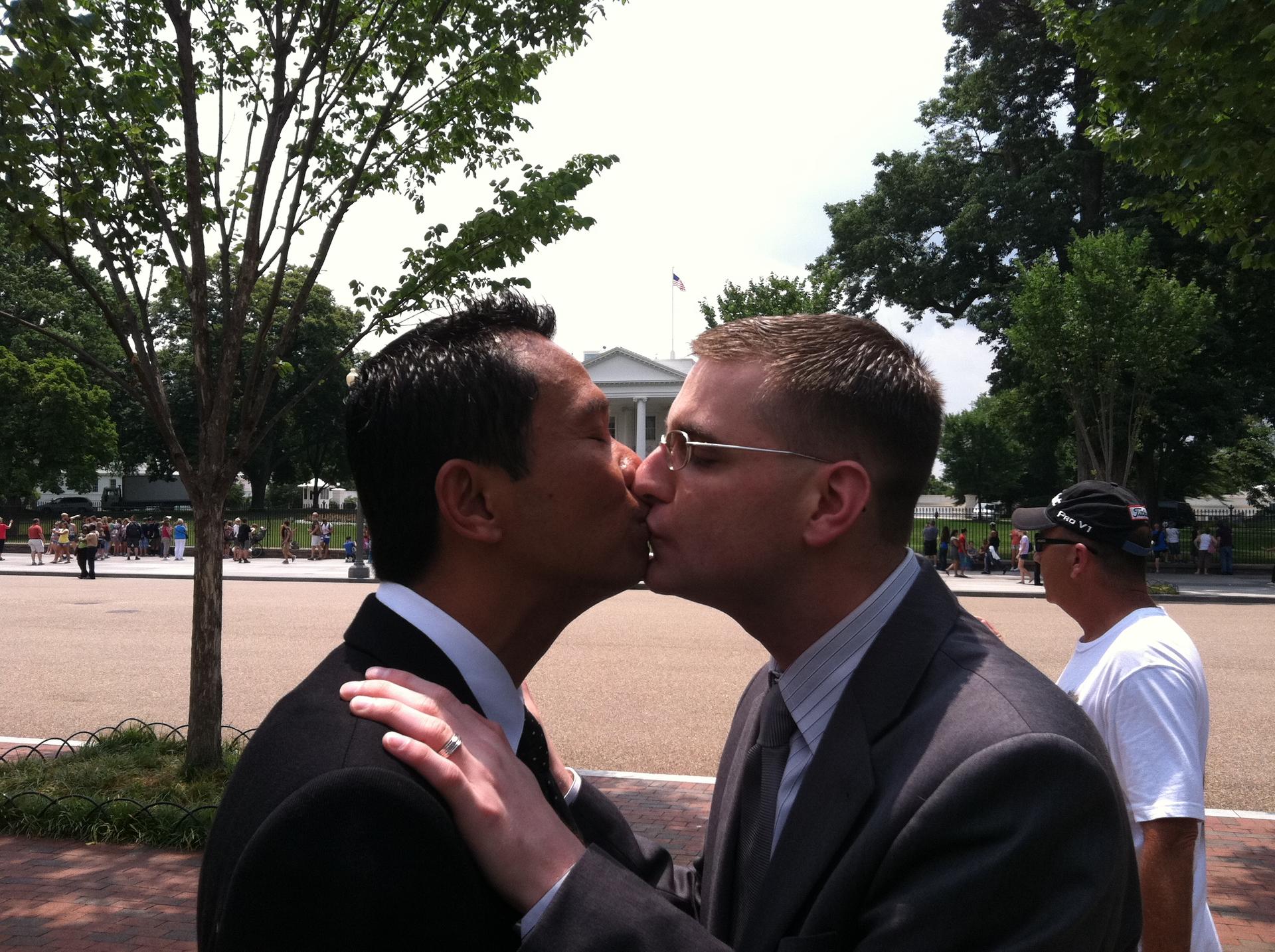For one gay couple, immigration reform could make all the difference
Anton Tanumihardja and Brian Andersen got married on June 12, 2011, and are pictured here, in front of the White House. Tanumihardja is from Indonesia and hopes that an upcoming Supreme Court ruling will allow Andersen to sponsor him for a green card. (Ph
In the U.S., the push is on to recognize gay marriage.
It’s an especially crucial issue for gay U.S. citizens who cannot get a green card for their foreign-born partners. A break might come from the Supreme Court, though, which will soon rule on two gay marriage cases.
Anton Tanumihardja and Brian Andersen already know what might happen this summer. There was a dress rehearsal two years ago, not long after the two men started dating in Philadelphia.
Things were good until Tanumihardja, from Indonesia, revealed his secret: He showed Andersen a letter ordering him out of the U.S., deported, by Feb. 14, 2011 — Valentine’s Day. It was just 10 days away.
But Tanumihardja wasn't ready to give up.
And fight they did.
“It was kind of a defining point of our relationship,” Andersen said. “We want to fight for what we have. We want to be together. What are we gonna do?”
To fight Tanumihardja’s deportation, there were late nights of letter writing and filling out paperwork. Tanumihardja half-joked about the stress of it all. It was like trying to survive a reality TV show contest, he said.
And it seemed he had lost when his departure date arrived. Tanumihardja was on his way to the airport — to go back to Indonesia — when his lawyer called. His deportation was halted, for now.
The couple now sees two possible solutions. One is through immigration reform — that Congress will allow U.S. citizen to petition for legal status for their same-sex spouse.
But that's not likely. Robert Gittleson, head of Conservatives for Comprehensive Immigration Reform, says adding a provision for gay couples is a deal breaker.
“For us, it would be extremely unfortunate,” Gittleson said. “We really want to have immigration reform. I mean, for me, this is my life, my most important issue. But while I understand there’s going to be a lot of disappointment in the LGBT community and I have sympathy for that, there are other ways that they can get what they want.”
That other possibility is the U.S>. Supreme Court. In June, the court is expected to rule on a challenge to the 1996 Defense of Marriage Act, a federal law defining marriage as solely between a man and a woman.
If the Supreme Court finds DOMA unconstitutional, it could open the door for married gay couples to seek green cards.
The Philadelphia couple has mixed expectations.
“I’m optimistic about it,” Andersen said.
But Tanumihardja isn’t and knows that, beyond his relationship, his identity is at stake. He left Indonesia in part because, he says, it's tough to be gay there. Indeed, in some Indonesian provinces, it's illegal to be gay. There have been violent attacks against gay men.
As Tanumihardja talks, he rests his hand on Andersen’s arm, something he wouldn’t do back home.
In the U.S., Tanumihardja has felt so comfortable about his relationship with Andersen that he allowed CNN to report a story about them and his fight to stay. But Tanumihardja didn't realize Indonesian newspapers would pick up the story and that his sexuality, long hidden from his family back home, would become widely known.
Today, deportation back to Indonesia hangs over Tanumihardja.
“Sometimes it’s a mess, my life, because I can not concentrate on one thing,” he said.
To relax, the couple tries to make the most of their time together, like at the Indonesian restaurant where they had their first date. They're regulars and usually stick around after all the other patrons have left.
“It’s like this is our memory place,” Tanumihardja said.
If they’re granted a future here, there is no doubt they will make many more memories.
